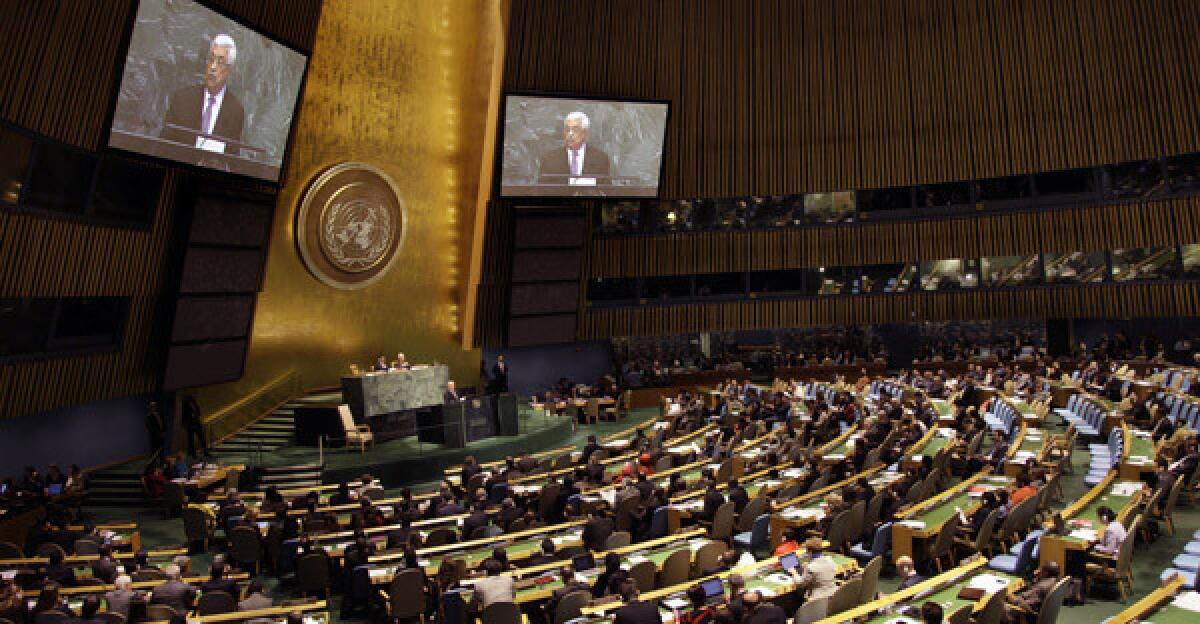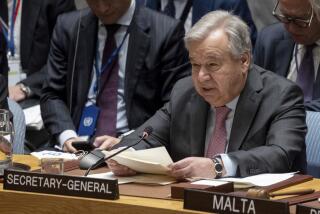Palestinians to seek elevated status in U.N. this month

- Share via
JERUSALEM — Facing a lack of progress in their statehood bid, Palestinian leaders said Monday that they would ask the United Nations General Assembly by month’s end to elevate their status in the international body from observer entity to nonmember state.
Though largely symbolic, an upgrade could make it easier for the Palestinians to join organizations such as the International Criminal Court, which previously rejected their complaint against Israel over its handling of the 2008-09 Gaza Strip assault. The court said it could intervene only on behalf of U.N.-recognized states.
A year ago, the Palestinian Authority sought full U.N. membership, but the effort was blocked by the Obama administration, which threatened to use its veto power in the Security Council. A vote for nonmember state status does not require council approval and Palestinians say they already have lined up support from a majority of the U.N.’s 193 members.
After President Obama’s reelection, there was some speculation that Palestinians might delay the U.N. bid to give the president time to reignite statehood negotiations between Israel and the Palestinians. But Palestinian leaders, who circulated a draft resolution at the U.N. last week, confirmed they would proceed this month. They have expressed frustration at being overshadowed by the “Arab Spring” movement, which has drawn international focus toward Syria, Egypt and Libya, and said they hoped the U.N. resolution would put Palestinian statehood back in the spotlight.
Israel and the Obama administration are lobbying against the U.N. measure, saying the only path to Palestinian statehood is at the negotiating table. Palestinians have refused to engage in peace talks until Israel halts its settlement construction in the West Bank and East Jerusalem.
Over the weekend, Obama telephoned Palestinian Authority President Mahmoud Abbas to ask him to delay the U.N. bid, but Abbas refused, Palestinian officials said. Abbas has said he will consider resuming talks with Israel after the U.N. vote, which he hopes will put Palestinians in a stronger bargaining position. Nearly 20 years of peace talks have failed to yield a final agreement between the two sides.
“We are not going back to humiliating negotiations,” said Mohammed Shtayyeh, a member of the Palestinian team working on the U.N. resolution. “There will either be meaningful negotiations or no negotiations at all.”
He said the date of the U.N. vote would be decided after an Arab League meeting Tuesday in Cairo, but most expect the resolution to be submitted Nov. 29.
Some Palestinians have hinted that Abbas might drop his demand for a settlement freeze if he wins the upgraded U.N. status, but Shtayyeh said Monday that peace talks would not resume until settlement construction was halted.
Israeli officials say U.N. approval of the status upgrade will only increase distrust and make Palestinians more intransigent. Foreign Minister Avigdor Lieberman has been lobbying European governments in recent days to oppose the resolution, though Israelis acknowledge that Palestinians probably have enough votes for passage even without European support.
Ministers in Israeli Prime Minister Benjamin Netanyahu’s government are strategizing about whether to respond by increasing settlement construction or withholding the transfer of tax revenue that Israel collects on behalf of Palestinians.
“If the Palestinians continue to advance their unilateral move, they should not expect bilateral cooperation,” Finance Minister Yuval Steinitz said last weekend.
After the Palestinians’ failed U.N. membership bid last year, Israel temporarily halted the transfer of about $100 million a month, but resumed the tax payments when it appeared the Palestinian Authority would otherwise collapse. The authority now faces an even bigger financial crisis, raising questions about whether withholding the money again could prove counterproductive.
Shtayyeh said Monday that Arab governments had promised to make up any shortfall in the event that Israel or the international community cut off funding.
Special correspondent Maher Abukhater in Ramallah, West Bank, contributed to this report.
More to Read
Sign up for Essential California
The most important California stories and recommendations in your inbox every morning.
You may occasionally receive promotional content from the Los Angeles Times.













